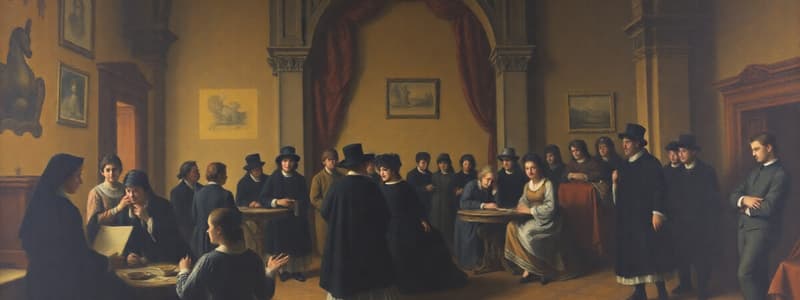Podcast
Questions and Answers
What is the primary focus of UCSP?
What is the primary focus of UCSP?
- Economic theories and practices
- The interplay between culture, society, and politics (correct)
- Historical events and their consequences
- Scientific advancements and their societal impacts
Which of the following best describes culture?
Which of the following best describes culture?
- A temporary set of practices adopted by individuals
- The shared beliefs, values, norms, and practices of a group (correct)
- Local traditions that are not shared outside a community
- The government policies that regulate social behavior
How does society influence individual behavior?
How does society influence individual behavior?
- By eliminating all personal choice
- Through the establishment of global political systems
- By providing universal laws that apply to everyone
- Through structured community relationships and social institutions (correct)
What are some of the types of societies mentioned?
What are some of the types of societies mentioned?
What role does government play in political systems?
What role does government play in political systems?
Which concept best illustrates the relationship between cultural values and political beliefs?
Which concept best illustrates the relationship between cultural values and political beliefs?
What does globalization impact according to UCSP?
What does globalization impact according to UCSP?
What skill does UCSP encourage in students?
What skill does UCSP encourage in students?
Which current issue does UCSP address?
Which current issue does UCSP address?
What is an important concept that connects social structure with political power?
What is an important concept that connects social structure with political power?
Study Notes
UCSP (Understanding Culture, Society, and Politics)
-
Definition: UCSP is an academic subject that explores the interplay between culture, society, and politics.
-
Objectives:
- To understand the concept of culture and its impact on society.
- To analyze social structures and their influence on individual behavior.
- To explore political systems and their relationship with culture and society.
-
Key Concepts:
-
Culture:
- Definition: The shared beliefs, values, norms, and practices of a group.
- Components: Language, rituals, customs, and arts.
- Importance: Shapes identity and influences social interactions.
-
Society:
- Definition: A structured community of people bound by relationships.
- Types: Various forms such as urban, rural, and tribal societies.
- Social Institutions: Family, education, religion, and economy.
-
Politics:
- Definition: The process by which groups make collective decisions.
- Political Systems: Democracy, authoritarianism, and totalitarianism.
- Role of Government: Regulation, enforcement of laws, and provision of public services.
-
-
Interconnections:
- Cultural Influence on Politics: Cultural values shape political beliefs and practices.
- Social Structure and Political Power: Social hierarchies affect power dynamics and access to resources.
- Globalization: Impact on cultural exchange, social change, and political relationships across nations.
-
Critical Thinking: Encourages analysis of societal issues, cultural diversity, and the role of citizens in governance.
-
Skills Developed:
- Analytical reasoning.
- Understanding of social dynamics.
- Awareness of cultural differences and political engagement.
-
Current Issues:
- Cultural identity in a globalized world.
- Social justice and equality.
- Political participation and civic responsibility.
UCSP (Understanding Culture, Society, and Politics)
- UCSP examines the relationships among culture, society, and politics, highlighting their interconnectedness.
- Objectives include grasping how culture impacts society, analyzing social structures affecting individual behaviors, and exploring the influence of political systems on culture and society.
Key Concepts
-
Culture:
- Defined as the collective beliefs, values, norms, and practices of a community.
- Key components include language, rituals, customs, and artistic expressions.
- Integral in shaping personal and group identity, influencing social interactions.
-
Society:
- Characterized as a structured community of individuals connected through various relationships.
- Different forms exist, including urban, rural, and tribal societies.
- Identified social institutions include family, education, religion, and economy.
-
Politics:
- Encompasses the processes through which groups achieve collective decision-making.
- Notable political systems include democracy, authoritarianism, and totalitarianism.
- Governments play pivotal roles in regulation, law enforcement, and public service provision.
Interconnections
- Cultural values significantly shape political beliefs and practices, illustrating the cultural influence on politics.
- Social hierarchies and structures dictate power dynamics and resource access, linking social structure to political power.
- Globalization facilitates cultural exchange and induces social change, affecting international political relationships.
Skills Developed
- Course fosters analytical reasoning and critical thinking about societal issues.
- Enhances understanding of social dynamics and awareness of cultural differences.
- Promotes political engagement and civic responsibility among students.
Current Issues
- Focus on cultural identity and its implications in a highly globalized environment.
- Emphasis on social justice and equality as crucial concerns in modern society.
- Encourages discussions around political participation and the responsibilities of citizenship.
Studying That Suits You
Use AI to generate personalized quizzes and flashcards to suit your learning preferences.
Description
This quiz delves into the fundamental concepts of Understanding Culture, Society, and Politics. It covers the definitions and significance of culture, the nature of society, and the dynamics of political systems. Explore how these elements interrelate and influence human behavior and societal structures.




